How Much Does It Cost to Remove Carpet?
People want to install new flooring for many reasons. Some want to update the look of a room. Others want to change the style from carpet to hardwood flooring, while there are also people that want to remove carpets because of medical reasons like allergies or asthma. Whatever the reason may be, to install new flooring, you would first need to remove your old carpeting.
The national average cost to remove a carpet is between $120 and $200, with most people paying around $186 to remove and dispose of carpet with padding from a 200 sq. ft. room and a flight of 13 stairs. At the low end of the spectrum, removing a carpet from one 200 sq. ft. room costs $100. At the high end, you will pay up to $300 to have a 200 sq. ft. carpet removed and disposed of from an odd-shaped room with furniture.
Cost to Remove Carpet
| Carpet Removal Cost | |
|---|---|
| National average cost | $186 |
| Average range | $120-$200 |
| Low-end | $100 |
| High-end | $300 |
Carpet Removal Cost by Project Range
Carpet Removal Cost by Location
Depending on the location where you want to remove the carpet, you can expect to pay between $0.50 and $3.10 per sq. ft. for a carpet removal project. The exact cost depends on the location of the removal. Every area of the home has a different shape. It will take a different amount of time and effort to remove an old carpet from each space. These variances affect the removal cost. Below are the most common areas where carpet is removed, and the cost homeowners pay for it.

| Location | Cost per Sq. Ft. (Materials and Labor) |
|---|---|
| Hardwood | $0.50 - $0.75 |
| Concrete | $0.50 - $1.50 |
| Bedroom | $0.50 - $1.50 |
| Basement | $1 - $1.50 |
| Stairs | $1 - $3.10 |
Removing Carpet From Hardwood
Homeowners typically pay between $0.50 and $0.75 per sq. ft. to remove a carpet from hardwood flooring. The carpet removal process is similar to the other surfaces, with contractors starting from the corner and going towards the center. Once the padding 1 is removed and the hardwood exposed, many homeowners decide to refinish the hardwood underneath the carpet instead of replacing it completely. If you’re doing this, you need to be very careful during the removal to avoid cutting the floors and damaging them. The area will be sanded 2, stained, and covered with a water-based polyurethane finish to return its old shine. This process typically costs between $850 and $1,260 for a 200 sq. ft. room.
Removing Carpet From Concrete
The process of removing carpet from concrete is similar to any other surface and costs between $0.50 and $1.50 per sq. ft. The contractor will cut the carpet into several smaller sections, pull it back starting from the corner, and then remove the staples and padding underneath. If the carpet is glued down, they may also use a scraping tool, boiling water, or a glue remover to completely remove the residue that remains below it. Since concrete is a tougher surface, you don’t have to worry about damaging it like other surfaces.
Removing Carpet From Bedroom
If you want to remove the old carpet from your bedroom, you can expect to pay $0.50 to $1.50 per sq. ft. To do this, you would first need to remove the bed and any other furniture in the room. Then, the contractor will follow the same removal process as in other areas. In most cases, removing carpet from bedrooms is not a challenging task. If the room has more corners or an odd shape, the cost to remove the carpet increases because the task is more complex.
Remove Carpet From Basement Floor
Removing carpets in basements costs anywhere between $1 and $1.50 per sq. ft. Basements typically contain more mold and dust than other places in the home, so carpets need to be replaced more frequently in these areas. To remove the carpet, the contractor will use pliers to detach the carpet from the walls and then start pulling it up along the wall towards the center. After you take off the padding, check to see if there is mold or dust stuck underneath the carpet and remove it before installing new flooring.
Cost to Remove Carpet From Stairs
If stairs are involved, most contractors typically charge a flat rate of $7 to $20 for each step. As the typical carpet used for stairs is 48’’ x 30’’, the average cost per sq. ft. is $1 to $3.10 per square foot 3. The higher cost can be attributed to the fact that stairs have more individual corners, making carpet removal more time-consuming. The contractor will typically remove the carpet and staples, strip the stain from the threads, and sand the threads to smooth out the surface and prepare it for the new flooring.
Labor Cost to Remove Carpet
Labor costs to remove carpet range from $0.50 to $1.50 per sq. ft. This price includes both the removal and the disposal of the carpet. Expect a higher labor charge if your area has high disposal fees or you live a good distance from the nearest landfill. When calculating the cost per sq. ft., contractors assume you have a square or rectangular-shaped room, but if your room has an odd shape with more corners, they may charge more to remove a carpet from it.
Contractors will start in one corner of your room by cutting a small slit in the carpet using a utility knife. This opening allows them to “grab” onto your carpet and tug it loose from its tacking strips. After loosening the carpet from one wall, they begin pulling or dragging the rug toward the center of the room.
It can take one to two hours to completely remove the carpet and padding from an average-sized room. This does not include the time spent moving furniture or clearing out the space. If the carpet removal specialists need to move furniture away to remove the carpet, this adds $1.50 to $2 per sq. yd. to the overall removal cost.
Cost to Remove Glue-Down Carpet
Removing a glued-down carpet is more expensive than removing one held with strips or staples, typically adding $3 to $5 per sq. yd. or $0.33 to $0.56 per square foot to the total project cost. To remove a glued carpet, your contractor will start by cutting off pieces of the carpet. As the glue will remain below it, they may use a scraping tool or a sharp object to remove the concrete adhesive and then apply hot water to soften the glue that remains. Even after applying water, there will still be glue stuck to the floor, which will be wiped with a chemical glue remover. To finish removing the carpet completely, the contractor will sand the area to remove the glue and flatten the surface.
Cost To Remove Carpet And Pad
Removing carpet costs between $0.50 and $1.50 per sq. ft., which includes removing both the carpet and the padding under it and disposing of the carpet afterward. Once the contractor removes the carpet, some chunks of the padding will remain on the floor. Those pieces will be removed along with the staples that held it in place. You do not need to have someone remove the tack strips. However, inspect them for signs of damage. If the strips are rusted, have rotten wood, or are delaminated, your contractor should remove and replace them as well.
In most cases, only tiny holes remain after removing carpet tack strips or staples. Covering over these holes will not affect how your new carpeting looks. However, when larger holes remain, you might need to have them filled with wood putty first. It takes only a few seconds to fill a hole with putty. Your contractor will probably not charge you anything extra for this.
Cost of Carpet Removal and Disposal
Most contractors assume they will also be responsible for hauling off the old carpet and include the disposal cost in the project quote. If you don’t like the idea of dumping carpet in a landfill, you may want to consider recycling. Through the Carpet America Recovery Effort (CARE), you can find a recycling center near you that will take your old carpet and turn it into everything from furniture to roofing shingles 4. Recycling centers charge anywhere from $0.05 to $0.25 per pound to recycle carpet. With the average carpet weighing around five pounds per sq. yd., carpet from a 200-sq. ft. room would cost between $2.33 and $11.67 to recycle.
It’s possible to donate old carpeting that is still in good shape, sell it to thrift stores for resale, or give it to charities that help people with home improvement projects. If you can’t find an organization to donate it to, you can list your old carpet on a site like Freecycle. You can repurpose your old carpet by cutting small squares to use as protective feet for delicate furniture legs or a weed block for your garden. You could also use it in various upholstery projects or to create a scratching post for a cat.
Cost to Tear Out Carpet and Install New Flooring
You can tear out your carpet and install new flooring afterward. The average removal and installation cost per sq. ft. is $2.50 - $59. Most carpet removal contractors specialize in installing other types of flooring after removing your old carpet. If you plan on installing new flooring, make sure to get a quote for it as well. Below you will find the most common flooring types installed after removing an old carpet, along with their average costs.

| New Flooring Type | Cost per Sq. Ft. (Materials and Labor) |
|---|---|
| Vinyl | $2.50 - $14 |
| Tile | $3 - $59 |
| Carpet | $5 - $14 |
| Laminate | $6.50 - $22.50 |
| Hardwood | $11 - $42 |
Cost to Remove Carpet and Install Vinyl Flooring
Installing vinyl flooring after removing old carpets can cost as little as $2.50 per sq. ft. If you install sheet vinyl 5, the cost may be as high as $14 per square foot for installing luxury vinyl planks. Vinyl flooring is becoming increasingly popular among homeowners because of its affordability and easy installation. This durable type of flooring comes in various finishes and textures that don’t require a lot of maintenance. On the downside, vinyl is not as durable as some other types of flooring like wood or tile, so it will require replacing within 10 or 20 years at most.
Remove Carpet And Install Tile
Tile flooring is one of the most expensive flooring types you can install, with the typical carpet removing and tile installing project cost ranging between $10 and $59 per sq. ft. Besides being the most expensive, it’s also one of the most durable flooring types that can be installed because of its resistance. If it’s properly maintained, tile flooring can last hundreds of years.
Carpet Removal And Installation Cost
Sometimes, homeowners remove an old carpet to install a new carpet. If you want to do this, expect to spend about $5 to $14 per sq. ft. to have the old carpet removed and a new one installed afterward. Carpets are often a flooring option for those that want to experiment with colors, patterns, textures, and materials. They also protect from injuries and are more soundproof than other types of flooring. Yet, carpet requires much more maintenance and is easily stained.
When you install carpet, make sure to consider the area on the stairs. It’s the area with the highest amount of traffic in the home, causing the carpet to age faster here. However, when the carpet on the stair needs replacement, five or ten years may pass, and the same carpet may not be available in stores. Make sure to buy a replacement carpet for the stairs to maintain the same look in your home without replacing the carpet flooring throughout the whole house.
Cost To Remove Carpet And Install Laminate
If you choose to install laminate flooring after removing the old carpet, expect to pay between $6.50 and $22.50 per sq. ft. for the overall project. Laminate flooring gives the classic look and warmth of hardwood flooring but is a cheaper alternative. It comes in various looks and finishes. However, laminate flooring lasts only around ten years, far shorter than hardwood or tile flooring, and is very vulnerable to scratches and tears.
Cost Of Removing Carpet And Installing Hardwood
Expect to pay between $11 and $42 per square foot 3 to install hardwood flooring after removing your old carpet. The exact cost depends on the type of wood you will choose to install and the thickness of the wood. The cheapest one is pine wood flooring, while the most expensive is walnut and teak hardwood. Hardwood flooring gives a classic warmth to the space in your home and is a common choice among homeowners because of its durability. On the downside, hardwood floors require a lot of maintenance and can be a costly investment.
Cost to Remove Carpet and Polish Floorboards
The cost to remove carpet is $1 to $2 per sq. ft. while polishing floorboards costs between $4.25 and $6.30 per square foot. This means that the overall cost to remove an old carpet, sand 2 the area, and add a finish to it will cost you $5.25 to $9.30 per square foot. The contractor will start by punching and puttying exposed nails and repairing any damage on the floor. Then, they will sand the area to flatten it. Once they have flattened and sanded the whole floor along with its edges and corners, the contractor will apply two coats of polish.
Polishing the floorboards gives the flooring a shiny, new look. This can be done to both new and old flooring types. The project’s exact cost depends on the age of the floor, the size of the room, and the type of stain and polish you use.

Signs That Your Carpet Needs To Be Removed
Make sure to keep an eye on your carpet to notice when it needs replacement. You may drop food on it, spill your drink, or step on it with dirty shoes, for which it will need extensive cleaning. The chemicals used to clean these types of stains will damage the carpet over time, so it would have to be replaced eventually. Even if the carpet doesn’t get dirty, it will get filled with dust particles, mold, and other allergens as you use it, so it will need to be removed and replaced with a new type of flooring.
You can plan to replace your carpet if it looks worn off, starts smelling bad, has missing or torn pieces in it, or is very stained from all the years using it. More importantly, you should urgently replace the carpet if some of your family members are getting sensitive or start having allergic reactions because of the allergens trapped in it.
Enhancement and Improvement Costs
Subfloor Repair
Repairing an existing subfloor means removing and replacing the damaged section(s). This repair can cost between $500 and $700 for a single room. On the other hand, replacing a subfloor can cost between $1,500 and $1,650 for 300 sq. ft. If your subfloor 6 is in poor condition, you will need to have it repaired before laying any new carpeting to keep the floor leveled. You could need a new subfloor if yours has soft spots, mold, water damage, or is sagging in certain areas.
Floor Trim Replacement
Installing or replacing floor trim can cost a homeowner between $0.60 and $10 per linear foot, depending on the material used and the thickness of the trim. It’s the material used where the floor meets the walls and around openings like doors and windows. It’s not an essential part of the flooring construction but rather an aesthetical detail added to the interior.
Additional Considerations and Costs
- If you have new carpet installed, you will probably find it more cost-effective to have the same contractor remove your old rug. Some installers will offer a discount of 10% or more on carpet removal services when they are also hired to lay the new carpet.
- Tools such as a utility knife, extra blades, claw hammer, and pry bar are needed for DIY carpet removal. If you do not already have these tools on hand, expect to pay between $32 and $60 to purchase them.
- Some cities have implemented “green building initiatives” to reduce waste from building demolition, home improvement, and construction projects. If your city has a green building initiative, you could be required to recycle your carpet or use only a certified disposal facility when dumping it.
- In most cases, contractors won’t have to remove the trim to install a new carpet. They will just run the tack strip up to the trim and roll the excess carpet under it.
FAQs
- What is the fastest way to remove carpet?
There is no one method that is faster than another. However, the project will go quicker if you have another person helping. That individual can work on the opposite side of the room and then meet you in the middle. He or she could also remove old rolls of carpet as they are cut up, which will allow you to continue working.
- How do you pull up carpet without damaging it?
Gently pull carpet away from the tack strips located just underneath the baseboards next to the wall. Once you have cleared the tack strips, the rest of your carpet is unlikely to tear unless it is in very poor condition. Rugs that already have rips or tears in them may not be salvageable.
- Is it easy to remove carpet?
It isn’t difficult to remove carpet; however, many people do find it tedious and time-consuming. Removing carpet also requires lots of bending, stooping, and crawling. These are tasks that not everyone is well-suited to do. Many homeowners hire a professional because they would rather not perform the work.
- Can I recycle my carpet?
You can recycle your carpet through the Carpet America Recovery Effort (CARE) for around $0.05 to $0.25 per pound.
- Can I just put my old carpet out on my regular garbage day?
Carpets aren’t accepted on regular garbage pickup days but are taken during bulk trash pickup days. If you can’t wait for the bulk trash pickup day, you can rent a renovation dumpster to quickly throw out all garbage at once.
Remodeling Terms Cheat Sheet
Definitions in laymen's terms, cost considerations, pictures and things you need to know.See full cheat sheet.
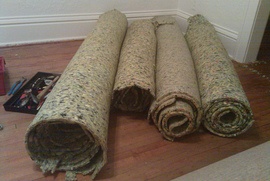 1 Padding: A cushion placed under a carpet to absorb impact, thus extending the life of the carpet
1 Padding: A cushion placed under a carpet to absorb impact, thus extending the life of the carpet
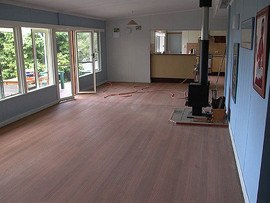 2 Sanded: Process of removing the top surface of a material, such as wood, using sandpaper and/or a specialized sanding machine (for large surface areas)
2 Sanded: Process of removing the top surface of a material, such as wood, using sandpaper and/or a specialized sanding machine (for large surface areas)
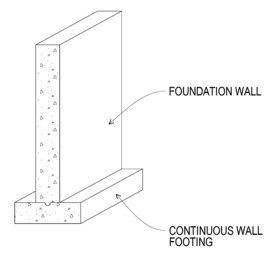 3 Foot: A support for the foundation of a house that also helps prevent settling. It is typically made of concrete reinforced with rebar, but can also be made of masonry or brick. It is usually built under a heavier part of the house like a wall or column, to distribute the weight of the house over a larger area.
3 Foot: A support for the foundation of a house that also helps prevent settling. It is typically made of concrete reinforced with rebar, but can also be made of masonry or brick. It is usually built under a heavier part of the house like a wall or column, to distribute the weight of the house over a larger area.
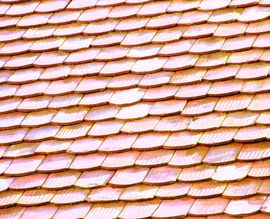 4 Shingles: A smooth, uniform, flat piece of construction material, available in a wide variety of materials and laid in a series of overlapping rows, used to cover the outside of roofs or walls to protect against weather damage and leaks.
4 Shingles: A smooth, uniform, flat piece of construction material, available in a wide variety of materials and laid in a series of overlapping rows, used to cover the outside of roofs or walls to protect against weather damage and leaks.
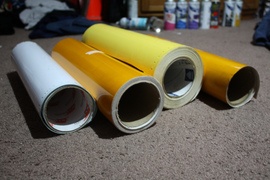 5 Vinyl: A synthetic plastic made from ethylene and chlorine. Vinyl has many applications in the construction industry and it is widely used in sidings, window frames, roofing and gutters, among others
5 Vinyl: A synthetic plastic made from ethylene and chlorine. Vinyl has many applications in the construction industry and it is widely used in sidings, window frames, roofing and gutters, among others
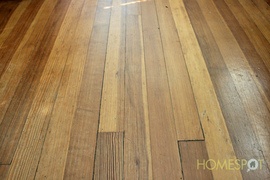 6 Subfloor: The bottom-most layer of a floor, supported by joists, over which finished flooring material is laid
6 Subfloor: The bottom-most layer of a floor, supported by joists, over which finished flooring material is laid
How much does it cost to remove carpet in my city?
Cost to remove carpet varies greatly by region (and even by zip code). To get free estimates from local contractors, please indicate yours.



